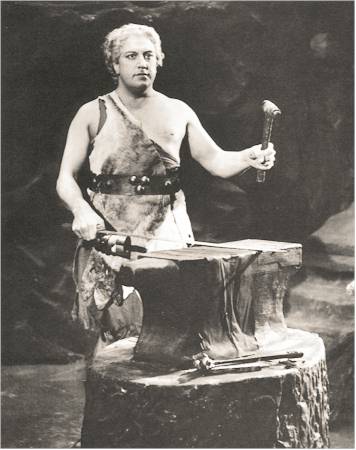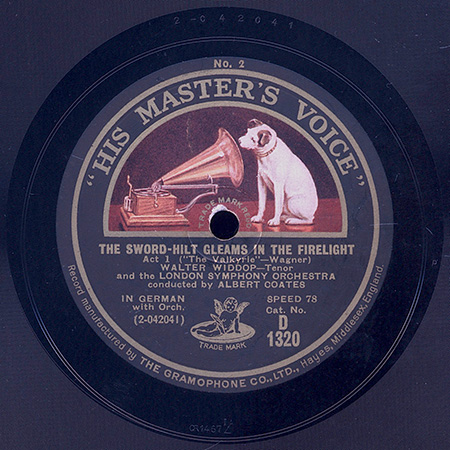Walter Widdop started working at the age of 12 at a woollen mill half the day, and went to school in the afternoon. Then he
became a dyer. His singing at work led to his singing in a local choir, and to his first music lessons with Arthur Hinchcliffe,
who had been a pupil of Charles Santley. Those lessons were paid for by Widdop's work colleagues. He began to sing locally, and
when he was drafted in WWI, he was assigned to the Entertainment Corps. After the war, he returned to the dye works, and to his
singing lessons. He sang in concerts and oratorios locally, and soon even in London. In 1922, basso Norman Allin arranged an
audition with the British National Opera Company for Widdop. As a result, he studied with Dinh Gilly in London for about one
year, then he made his operatic debut with the British National Opera Company, as Radamès in Leeds (in 1923, at age 31); Samson
was next, and he remained with the British National Opera Company until 1929.
But from 1924, he also sang regularly at Covent Garden, where his first role was Siegfried – and he became a regular in
Covent Garden's Wagner performances during their International Seasons (which was uncommon for a British singer). Other than
Siegfried, he sang Siegmund, Tannhäuser, and particularly Tristan; plus Renaud in Gluck's Armide, Max, Ägisth,
Tambourmajor, and Bagoas in the world premiere of Judith by Eugène Goossens (Covent Garden, 25 June 1924). In
1936, he sang Stravinsky's Oedipus rex in the British (concert) premiere under Ernest Ansermet.
He always did a lot of concert work, too, Händel oratorios in particular. But he was also in the world premiere of
Serenade to music by Ralph Vaughan Williams (Royal Albert Hall, 5 October 1938).
His career was basically limited to the UK; he made but few appearances abroad (opera in Barcelona and Lisbon, oratorio in
Amsterdam, song recitals in the US). Only in WWII, he toured extensively in the service of British troop entertainment (Middle
East, Canada, South Africa). Particularly in his early years, he was often chided for his clumsy stage acting, but it seems to
have become better with time.
In July 1949, he sang Parsifal under Adrian Boult at the Royal Albert Hall, and on September 5th, he sang Lohengrin's Farewell
in a Promenade concert. After the performance, he collapsed in his dressing room, and died the following day.
Reference 1, reference 2 and picture source

